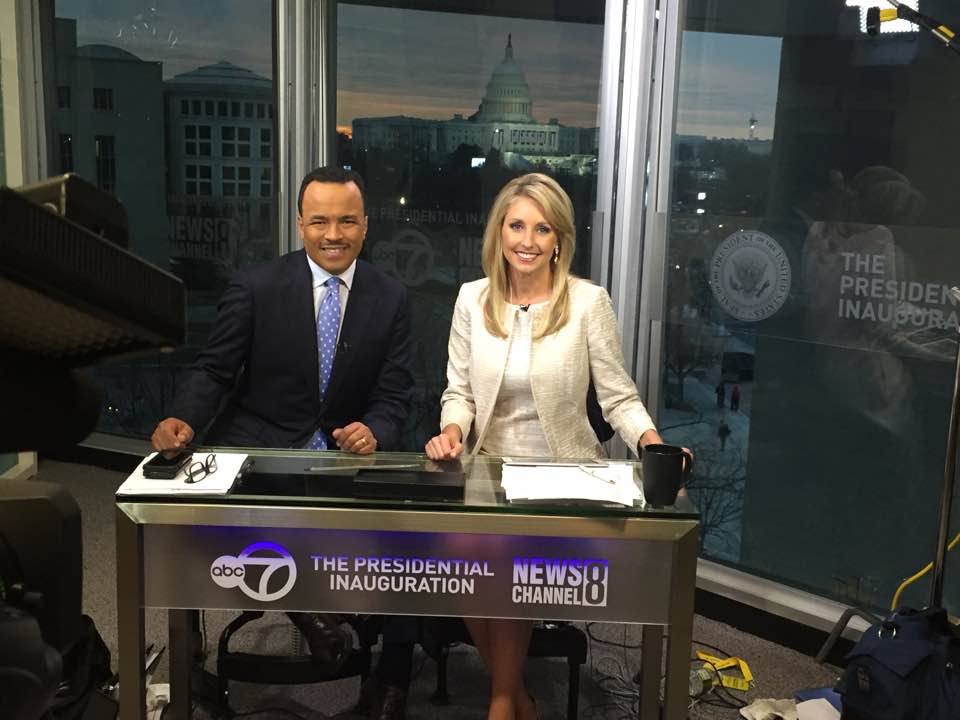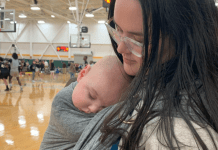This is a guest post from Autria Godfrey.
I can still vividly remember the worst of the panic attacks.
It was 2:30 in the morning and I was sitting in the floor in my daughter’s nursery. My heart was racing and my hands were shaking as I frantically scrolled through the live feed of her nursery camera to go back and find the exact moment someone else’s hands appeared in her crib and tried to take her out.
Of course, I never found the moment. It didn’t exist. But in my mind it was real enough to catapult me out of my bed and into her room where my eight-week-old was quietly sleeping.
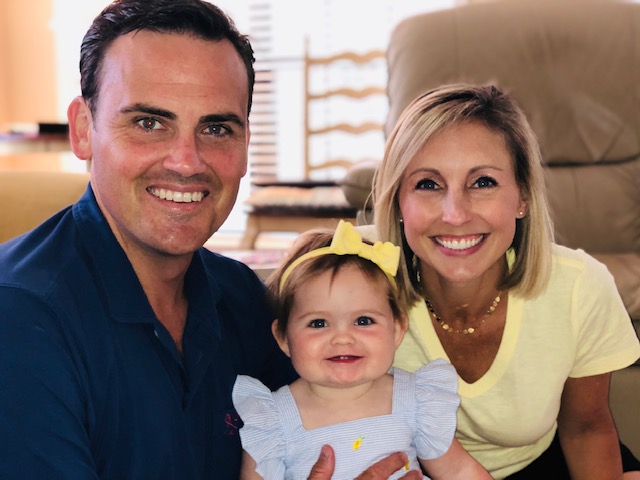 That anxiety-induced hallucination should have been my wake-up call that the postpartum anxiety I was dealing with was spiraling into something of concern. But it wasn’t.
That anxiety-induced hallucination should have been my wake-up call that the postpartum anxiety I was dealing with was spiraling into something of concern. But it wasn’t.
Sadly, no one told me to look out for what I was experiencing as postpartum anxiety.
The conservative estimates are that roughly 20% of women experience postpartum anxiety, but those statistics are sketchy at best. The reason? It’s not formally recognized as a separate mood disorder that strikes women who have just given birth according to Dr. Alexa Andewelt, a psychiatrist practicing in Washington, DC.
“Although it is a significant issue, postpartum anxiety is not a diagnosis in the Diagnostic and Statistical Manual of Mental Disorders, 5th Ed. (which is the psychiatric diagnostic manual) so there is no formal description. Instead, postpartum anxiety is often looked at simply as an anxiety disorder that is defined in the DSM-V such as generalized anxiety disorder, Panic Disorder, Obsessive-Compulsive disorder, …that develops postpartum,” Dr. Andewelt explains.
Because it is frequently swept under the umbrella of postpartum depression, many women (like myself) tell themselves “nothing is wrong.”
I wasn’t depressed.
I didn’t want to harm myself.
I didn’t want to harm my baby.
I didn’t have feelings of hopelessness, worthlessness, or malaise.
By my own definition of depression, I didn’t check the box. I wasn’t depressed, but I also wasn’t ok.
Panic attacks were a regular occurrence. I couldn’t sleep at night even when the baby did. As soon as I heard the first whimper out of her that she was awake, my heart began beating out of my chest. I could feel the adrenaline coursing through my veins. I was convinced I wouldn’t be able to stop the crying once it started. And, I became fixated on the number of hours she slept, the time she went to sleep, and the time she woke up. In fact, I didn’t want to entertain visitors or leave my house because “what if she started crying?!” I constantly viewed my crying baby as a sign of failure.
All of these things, Dr. Andewelt says, sound familiar.
“While most women have heard about postpartum depression, when postpartum anxiety appears on its own, women often find the symptoms to be ego-syntonic. They think that they are the problem, rather than they have a medical problem. Women often present saying that they worry a lot because they think that they are inadequate mothers, that they don’t know how to parent.”
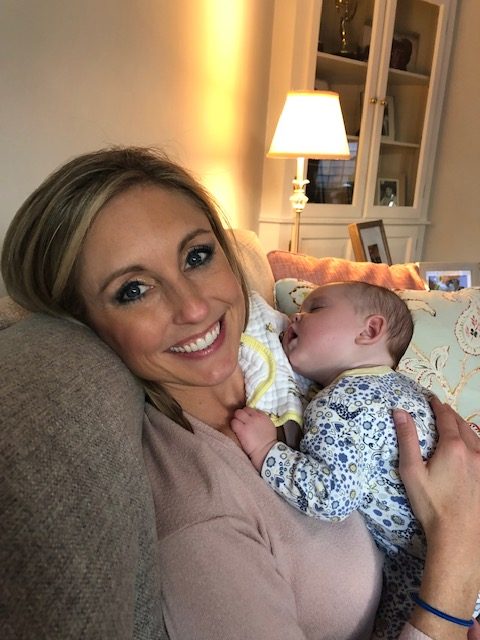 Our lives were a debilitating cycle of good days and bad days that went unchecked for six months. It wasn’t until Christmas when we traveled home to see my family that I recognized something was wrong. My mom and sisters became the mirror I had been avoiding for months. They were quick to point out their concerns over my OCD tendencies, my obsession with her sleep cycles, my short-tempered outbursts if heaven-forbid she didn’t sleep the EXACT amount of time she should have. They were surprised by how irrational I was about insignificant things. And they expected me to be calmer under pressure given how my career had shaped me to do just that for more than a decade. In hindsight, I should’ve gone to a professional and Dr. Andewelt agrees.
Our lives were a debilitating cycle of good days and bad days that went unchecked for six months. It wasn’t until Christmas when we traveled home to see my family that I recognized something was wrong. My mom and sisters became the mirror I had been avoiding for months. They were quick to point out their concerns over my OCD tendencies, my obsession with her sleep cycles, my short-tempered outbursts if heaven-forbid she didn’t sleep the EXACT amount of time she should have. They were surprised by how irrational I was about insignificant things. And they expected me to be calmer under pressure given how my career had shaped me to do just that for more than a decade. In hindsight, I should’ve gone to a professional and Dr. Andewelt agrees.
“Women should seek professional treatment if the anxiety interferes in their daily life, sleep, bonding with the baby, or if they are preoccupied with worries. I’d recommend if the question of seeking treatment even crosses a new mother’s mind, they should specifically ask their obstetrician about mental health treatment, or directly seek an evaluation by a mental health professional,” she says.
Rather than seeking help, I tried to address the little things that I could actually control that I knew triggered anxiety. I got off social media, completely. Comparing my rough behind-the-scenes real life to everyone else’s highlight reel was only exacerbating the feelings of failure. I can’t overstate enough how much removing myself from the phony world of social media helped. Also, I gave my diet an overhaul. I cut out all the foods and drinks that were known to increase anxiety (caffeine, alcohol, etc.).
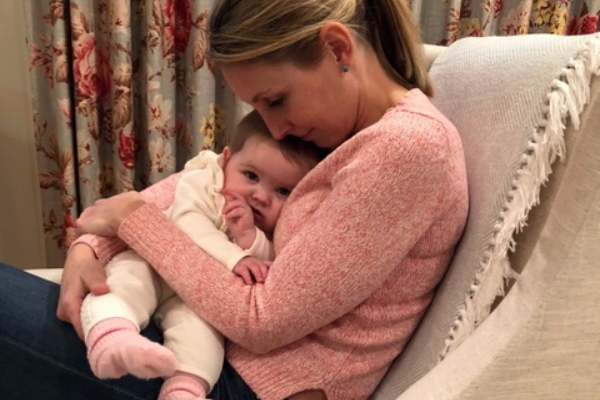 I also started opening up to my fellow mom friends about the wild anxiety I had experienced and turns out, I was far from alone. Collectively we realized that while we shared many of the same symptoms. We each had anxious thoughts and worries that were unique. Yet not one of us had been warned about the potential for postpartum anxiety from our doctors, families, or friends. We were all in agreement that the main takeaway for new mothers was mainly just the idea that if you didn’t want to hurt yourself or your baby, then you were A-OK. And instead, my friends and I dragged ourselves through the trenches of these irrational thoughts, obsessions, and worries all alone.
I also started opening up to my fellow mom friends about the wild anxiety I had experienced and turns out, I was far from alone. Collectively we realized that while we shared many of the same symptoms. We each had anxious thoughts and worries that were unique. Yet not one of us had been warned about the potential for postpartum anxiety from our doctors, families, or friends. We were all in agreement that the main takeaway for new mothers was mainly just the idea that if you didn’t want to hurt yourself or your baby, then you were A-OK. And instead, my friends and I dragged ourselves through the trenches of these irrational thoughts, obsessions, and worries all alone.
It took time to work through my anxiety, but I would say within two months I saw a noticeable difference. She’s awake at 2 am? Ok. I’ve got this. She’s crying? No biggie, she’s a baby!
If you have anxious thoughts or panic attacks, know you are not alone and you don’t have to suffer alone. Be sure to find a therapist today. You and your family deserve it!
What I still find fascinating by the whole experience, is that for 13 years I was a news reporter/anchor. Every day, I would wake up and jump in front of a camera to talk about the topic du jour. I never knew what each day was going to hold. And, I didn’t know what topic I would be expected to be an immediate expert on or if I might find myself standing in front of a senator or governor asking about the crisis of the moment. You might think, ALL of these scenarios would trigger panic attacks on a regular basis—that I would be a walking ball of anxiety at any given moment. But no. Not at all. It turns out, a screaming protester or a yelling congressman was no match for the tiny whine of an eight-pound little lady.
About our Guest Author:
Autria Godfrey is an Emmy-award winning news anchor who has spent the last decade in Washington, DC. After beginning her career in Charlottesville, VA, Autria moved to Washington to work for Fox News Channel, CBS Newspath, and eventually Tribune Broadcasting as the White House and Congressional Correspondent for the DC Bureau. Autria and spent the last 8 years at WJLA, most recently as morning anchor of Good Morning Washington. Autria has covered both President Obama’s and President Trump’s inaugurations, Pope Francis’s visit to Washington DC, and the Country Music Awards in Nashville, TN. She lives in the district with her husband Paul and daughter Eliza.
